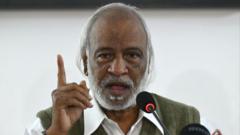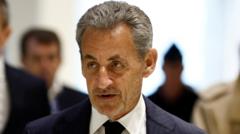Former French President Nicolas Sarkozy is currently embroiled in a trial linked to allegations of receiving illicit campaign financing from Libya's late leader, Muammar el-Qaddafi, during his 2007 election campaign.
Nicolas Sarkozy Faces Potential Seven-Year Sentence in Libya Campaign Financing Case

Nicolas Sarkozy Faces Potential Seven-Year Sentence in Libya Campaign Financing Case
Prosecutors push for severe penalties in a landmark trial that could significantly tarnish the former president's legacy.
The prosecution, in a dramatic turn of events, has called for a seven-year prison term for Sarkozy, who served as president from 2007 to 2012. This proposed sentence is unprecedented in the context of post-war French politics for a former head of state.
As the trial unfolds in Paris, Sarkozy has firmly denied any wrongdoing and is gearing up for the defense phase of the proceedings. His legal team is slated to present their closing arguments next month, after which a verdict will be reached at a later date.
The prosecution's request highlights the significance of this case compared to Sarkozy's previous legal troubles, with the potential prison sentence underscoring the severity of the allegations. Beyond incarceration, the prosecutors are also seeking a fine of €300,000 (approximately $340,000) and a lifetime ban from holding any elected office, along with the removal of Sarkozy's civic rights.
The former president responded vigorously to the prosecution's demands, arguing that the charges against him are baseless and that the harsh sentence sought is intended to obscure the shortcomings of the case. He emphasized the legitimacy of his campaign's funding and accused the judicial process of being tainted by political motivations.
The complex case spans years, revolving around purported illegal contributions from el-Qaddafi’s regime, which has been a point of contention and debate within French political circles since the Libyan leader's fall in 2011. As the trial continues, the implications for Sarkozy, now a political elder statesman with influence but no formal office, remain profound.
The outcome of this trial not only threatens Sarkozy's personal legacy but may also reverberate through the French political landscape, as former leaders face increasing scrutiny over their campaign financing activities.
As the trial unfolds in Paris, Sarkozy has firmly denied any wrongdoing and is gearing up for the defense phase of the proceedings. His legal team is slated to present their closing arguments next month, after which a verdict will be reached at a later date.
The prosecution's request highlights the significance of this case compared to Sarkozy's previous legal troubles, with the potential prison sentence underscoring the severity of the allegations. Beyond incarceration, the prosecutors are also seeking a fine of €300,000 (approximately $340,000) and a lifetime ban from holding any elected office, along with the removal of Sarkozy's civic rights.
The former president responded vigorously to the prosecution's demands, arguing that the charges against him are baseless and that the harsh sentence sought is intended to obscure the shortcomings of the case. He emphasized the legitimacy of his campaign's funding and accused the judicial process of being tainted by political motivations.
The complex case spans years, revolving around purported illegal contributions from el-Qaddafi’s regime, which has been a point of contention and debate within French political circles since the Libyan leader's fall in 2011. As the trial continues, the implications for Sarkozy, now a political elder statesman with influence but no formal office, remain profound.
The outcome of this trial not only threatens Sarkozy's personal legacy but may also reverberate through the French political landscape, as former leaders face increasing scrutiny over their campaign financing activities.






















